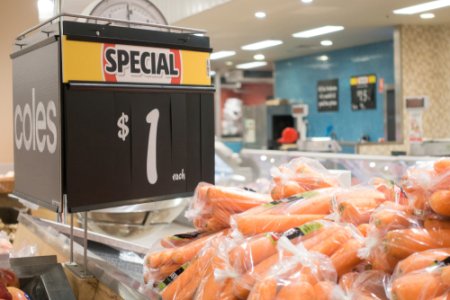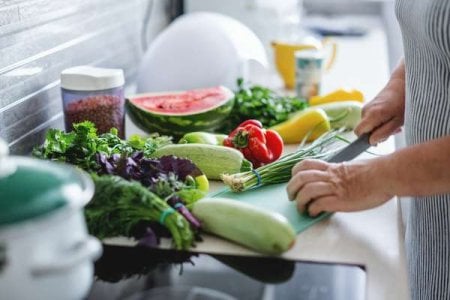Slash your grocery bills with these 10 genius tips at Coles, ALDI, and Woolworths
In today's economic climate, where every cent counts, savvy shopping has become more than just a way to stretch the dollar—it's a necessity.
For our members at the Seniors Discount Club, managing a budget is a familiar challenge, and grocery shopping is one area where costs can quickly spiral.
But fear not! With a few strategic moves, you can take control of your supermarket spending at Coles, ALDI, and Woolworths.
Here are 10 genius tips from experts to help you slash your grocery bills and keep your wallet happy:
CHOICE Content Producer Liam Kennedy pointed out: ‘Pre-cut fruit and veggies can cost five times as much per kilo as unprocessed originals.’
‘If you want to save, I would encourage you to sharpen up your knife skills and cut them up yourself,’ he added.
‘To combat this, Australians can adopt storage techniques such as freezing food to extend shelf life beyond their use-by dates, and develop meal-planning habits to ensure everything they buy is utilised,’ he explained.
CHOICE also recommended shopping for fresh produce in small quantities to avoid food waste.
This simple act prevents duplicate purchases. Then, arm yourself with a shopping list for what you actually need. This disciplined approach can save you from impulse buys and keep your grocery shop focused and efficient.
Supermarkets are adept at placing tempting deals in strategic locations. Stick to your list, and don't let those 'specials' derail your budget.
It's worth noting that not all specials are bad. Finder has found that some supermarkets offer discounts on food items that are approaching their use-by dates at the end of the day.
This can lead to more savings for you if you're able to cook the food immediately or freeze it for later use.

This is especially useful for bulk purchases. Items like honey, for example, are far more economical when bought in larger quantities.
Kennedy explained: ‘You’re paying 40 per cent more for 100 grams on your smallest bottle to your bigger jars. You can probably get better value for bulkier items and unit prices across brands.’
Warehouse stores like Costco may charge a membership fee, but they offer significant savings for bulk purchases. Combine this with batch cooking to make meals like a hearty Bolognese, and freeze portions for later. This approach saves time and money.
‘Consumers can vote with their dollars and buy more “imperfect” fruit and vegetables from suppliers,’ Ball stated.
By choosing 'imperfect' produce from initiatives like ‘The Odd Bunch’ at Woolworths, ‘I’m Perfect’ at Coles and ‘Imperfect Picks’ at Harris Farm, you can save up to 30 per cent on your grocery bill.
Another alternative is to buy produce from local growers, such as co-ops, farmers' markets, or other sources, in order to get the best value for your money.
As an alternative, Finder suggested buying canned foods as they are typically processed shortly after harvest.
You could also check the month’s pick for best-value fruits and vegetables.
‘We encourage people not to shop on autopilot and pay attention to where they’re buying and what they’re buying to save money,’ he continued.
According to CHOICE, shopping at multiple stores can save up to 40 per cent on weekly groceries.
Finder also suggested utilising apps that can help you search for deals and compare prices of products.

ALDI does not have a loyalty program, which is due to its focus on offering low prices.
Finder said that if you want to save on expenses, you should purchase your everyday essentials at ALDI.
However, it is advisable to avoid impulsive purchases from the Special Buys section.
Also, opt for refill packages for products like handwash to save money and reduce plastic waste.
CHOICE reported that refills can save an average of 32 per cent compared to pre-filled dispensers.
‘Instead of buying the pre-filled dispenser and starting again, get those items in the supermarket,’ he advised.

By implementing these tips, you'll save money and become a more conscious and efficient shopper.
Do you have other tips to share? Let us know in the comments below!
For our members at the Seniors Discount Club, managing a budget is a familiar challenge, and grocery shopping is one area where costs can quickly spiral.
But fear not! With a few strategic moves, you can take control of your supermarket spending at Coles, ALDI, and Woolworths.
Here are 10 genius tips from experts to help you slash your grocery bills and keep your wallet happy:
1. Skip the pre-cut convenience
It's tempting to grab those pre-cut fruits and veggies for a quick meal solution, but you're paying a premium for the convenience.CHOICE Content Producer Liam Kennedy pointed out: ‘Pre-cut fruit and veggies can cost five times as much per kilo as unprocessed originals.’
‘If you want to save, I would encourage you to sharpen up your knife skills and cut them up yourself,’ he added.
2. Wise up on waste
Josh Ball, Co-Founder of Farmer’s Pick, highlighted that ineffective use of use-by dates is a major contributor to food waste, which hits our wallets hard.‘To combat this, Australians can adopt storage techniques such as freezing food to extend shelf life beyond their use-by dates, and develop meal-planning habits to ensure everything they buy is utilised,’ he explained.
CHOICE also recommended shopping for fresh produce in small quantities to avoid food waste.
3. Check your pantry and make a shopping list
Before you even set foot in a store, take stock of what you already have.This simple act prevents duplicate purchases. Then, arm yourself with a shopping list for what you actually need. This disciplined approach can save you from impulse buys and keep your grocery shop focused and efficient.
4. Beware of 'Special' traps
While specials can be a boon for budget shoppers, they can also lead to unplanned spending.Supermarkets are adept at placing tempting deals in strategic locations. Stick to your list, and don't let those 'specials' derail your budget.
It's worth noting that not all specials are bad. Finder has found that some supermarkets offer discounts on food items that are approaching their use-by dates at the end of the day.
This can lead to more savings for you if you're able to cook the food immediately or freeze it for later use.

Some supermarkets offer discounts on food items approaching their use-by dates, according to Finder. Image source: Shutterstock
5. Bulk buying and batch cooking
Look beyond the headline price and check the unit price, which breaks down the cost into standard units of measurement.This is especially useful for bulk purchases. Items like honey, for example, are far more economical when bought in larger quantities.
Kennedy explained: ‘You’re paying 40 per cent more for 100 grams on your smallest bottle to your bigger jars. You can probably get better value for bulkier items and unit prices across brands.’
Warehouse stores like Costco may charge a membership fee, but they offer significant savings for bulk purchases. Combine this with batch cooking to make meals like a hearty Bolognese, and freeze portions for later. This approach saves time and money.
6. Embrace imperfect produce
Perfectly good fruits and veggies are often discarded for not meeting aesthetic standards.‘Consumers can vote with their dollars and buy more “imperfect” fruit and vegetables from suppliers,’ Ball stated.
By choosing 'imperfect' produce from initiatives like ‘The Odd Bunch’ at Woolworths, ‘I’m Perfect’ at Coles and ‘Imperfect Picks’ at Harris Farm, you can save up to 30 per cent on your grocery bill.
Another alternative is to buy produce from local growers, such as co-ops, farmers' markets, or other sources, in order to get the best value for your money.
7. Seasonal and alternative shopping
Fresh produce is most affordable in season. When it's not, consider frozen or canned alternatives, which are often cheaper and just as nutritious.As an alternative, Finder suggested buying canned foods as they are typically processed shortly after harvest.
You could also check the month’s pick for best-value fruits and vegetables.
8. Shop around and compare
Kennedy advised against shopping on autopilot. He said: ‘Without really thinking about it, we always go to the same shop and always go to the same products, the same brand, in the same size.’‘We encourage people not to shop on autopilot and pay attention to where they’re buying and what they’re buying to save money,’ he continued.
According to CHOICE, shopping at multiple stores can save up to 40 per cent on weekly groceries.
Finder also suggested utilising apps that can help you search for deals and compare prices of products.

Kennedy advised shoppers to be mindful of their purchase decisions and the places they shop from. Image source: Shutterstock
9. Join loyalty programs and shop at ALDI
Participate in loyalty programs like Flybuys at Coles and Everyday Rewards at Woolworths to earn points for discounts or future rewards.ALDI does not have a loyalty program, which is due to its focus on offering low prices.
Finder said that if you want to save on expenses, you should purchase your everyday essentials at ALDI.
However, it is advisable to avoid impulsive purchases from the Special Buys section.
10. Consider home brands
Kennedy said that shoppers should pay attention to home brands, which have improved in quality and can offer significant savings.Also, opt for refill packages for products like handwash to save money and reduce plastic waste.
CHOICE reported that refills can save an average of 32 per cent compared to pre-filled dispensers.
‘Instead of buying the pre-filled dispenser and starting again, get those items in the supermarket,’ he advised.
Key Takeaways
- Australian consumers are seeking ways to save money on groceries amidst high living costs, with some sacrificing outings and fresh produce.
- To cut expenses, experts suggest avoiding pre-cut fruits and veggies, using ‘use-by’ dates effectively, planning meals, and being mindful of supermarket sales tactics.
- Buying in bulk, choosing imperfect produce, and comparing prices at different stores are recommended strategies for reducing grocery bills.
- Loyalty programs and home brands can offer significant savings, and consumers should consider using refill packs to both save money and reduce plastic waste.
Do you have other tips to share? Let us know in the comments below!
Last edited by a moderator:








